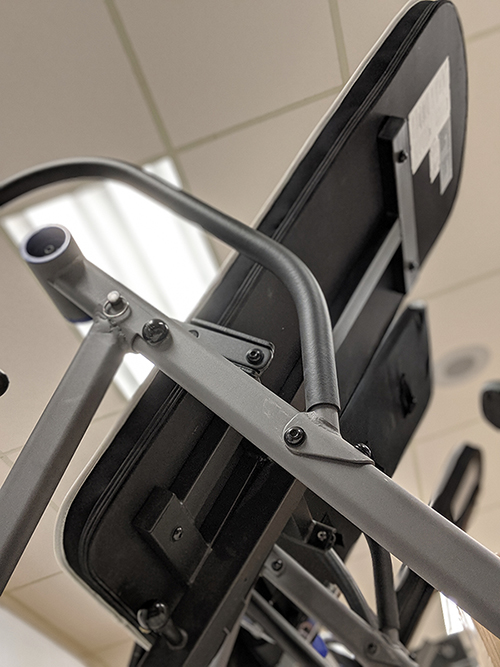While Inversion Table therapy, a home treatment for low back pain, has its strong proponents, the scientific basis for its medical effectiveness is questionable. Moreover, our experience at Hayes+Associates (H+A) with cases involving Inversion Table injuries suggests that there are inherent, potentially catastrophic risks associated with use of these devices.
Inversion Table therapy involves suspending the user in a partial or fully upside-down position on a backward tilting platform. The user is attached to the platform by one of several mechanisms that are meant to secure the ankles.
Many who suffer from low back pain believe passionately in the benefits of inversion therapy. However, the scientific evidence for beneficial effects is strongly contested. The Harvard Medical School newsletter asserts: “Proponents claim that inversion table therapy not only relieves back pain but also improves posture, preserves height, increases flexibility, stimulates blood flow to the brain and scalp, corrects the position of abdominal organs, and relieves varicose veins,” but, the publication maintains, “none of these assertions has any scientific basis.” https://www.health.harvard.edu/newsletter_article/do- inversion-tables-work
Inversion Table injuries we have analyzed at H+A include fracture-dislocation of the neck with quadriplegia, head injury, paraplegia and, in two cases, death, one by spinal cord injury and another by positional asphyxiation when the user, fully inverted, could not return the table to the upright position.
Two recent H+A cases, Chong v. STL Int’l and Fuit v. Elite Fitness, highlight one of the major problems associated with the use of these devices. In 2012, Jeanie Chong, age 49, inverted on her table as she had done without mishap twice daily for over a month. However, one day, in full inversion, the mechanism meant to secure her ankles malfunctioned and her feet slipped out of her shoes. As a result, she fell about two feet onto her head. In 2014, Richard Fuit, age 53, fell 8 or 9 inches onto his head when the ankle restraint on his Inversion Table failed, resulting in severe injuries to his neck and spine. Both incidents resulted in permanent paraplegia.
H+A Senior Engineer, Erik D. Power, PhD, analyzed the ankle mechanisms on Ms. Chong’s and Mr. Fuit’s Inversion Tables, identifying the unique design defects that led to each of their falls. In both cases, H+A President Wilson C. “Toby” Hayes, PhD, evaluated the biomechanics of the injuries that resulted, estimating the force of impact Ms. Chong and Mr. Fuit sustained. Based on the fundamental laws of physics, he concluded that both Plaintiffs’ catastrophic injuries were the direct result of design defects in the ankle restraint mechanisms. Both the Chong and Fuit cases settled prior to going to trial.
Recalls of inversion tables are legion, some of them voluntary and some mandated by the United States Consumer Protection Safety Commission (CPSC). In many of the recalled tables, it is the ankle-restraining hardware that is at issue. In some cases, manufacturers offer free replacement apparatus to more reliably restrain the user’s feet. In others, owners are advised to discontinue use and a refund is offered. In all cases, consumers are warned to stop using the defective machines.
Recently, some Owner’s Manuals for Inversion Tables noted that 100% inversion is unnecessary for full benefit from the machine. One such manual asserts that users “can gain all the benefits of inversion without ever inverting beyond 60 degrees.”
Such statements comport with H+A analysis. In their Fuit report, Power and Hayes noted: “For inversion angles of 60° or less, the neck impact forces would be greatly reduced in the event of a device failure. Also, at non-vertical angles, the head would be likely to slide along the floor, thus allowing the neck to ‘escape’ the [full inversion] compressive forces generated as the torso crushes down on the neck.”
Hayes+Associates, Inc. (http://www.hayesassoc.com) is an expert witness and consulting firm, based in Corvallis, OR. The company brings more than 75 years of collective experience in academic research, university teaching and forensic testimony to practice areas that include vehicle collisions, premises safety, slips and falls, products liability, worker safety, sports and recreation, patent litigation and criminal matters.


